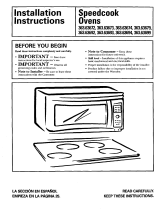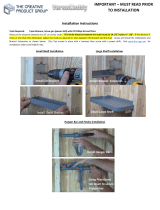3
GENERAL INFORMATION
This installation guide will show you how to install your new over-the-range microwave.
Before you Begin
Read these instructions completely and carefully.
• IMPORTANT – Save these instructions for local inspector’s use.
• IMPORTANT – Observe all governing codes and ordinances.
• Note to Installer – Be sure to leave these instructions with the consumer.
• Note to Consumer – Keep these instructions for future reference.
• Skill level – Installation of this appliance requires basic mechanical and electrical skills.
• Proper installation is the responsibility of the installer.
• Product failure due to improper installation is not covered under the Warranty.
Important Safety Instructions
IMPORTANT–PLEASE READ CAREFULLY. FOR PERSONAL SAFETY, THIS APPLIANCE MUST
BE PROPERLY GROUNDED TO AVOID SEVERE OR FATAL SHOCK.
• This product requires a three-prong, properly grounded outlet for safe
operation. If not properly grounded, of if the outlet does not meet the electrical
requirements listed in the Electrical Requirements section below, a qualified
electrician should be employed to correct any deficiencies.
• The power cord of this appliance is equipped with a three-prong (grounding)
plug which mates with a standard three-prong (grounding) wall receptacle to
minimize the possibility of electric shock hazard from this appliance.
• You should have the wall receptacle and circuit checked by a qualified electrician to make sure
that the receptacle is properly grounded.
• Where a standard two-prong wall receptacle is encountered, it is very important to have it
replaced with a properly grounded three-prong wall receptacle installed by a qualified electrician.
NOTE: For easier installation and personal safety, it is recommended that two people install this
product.
Caution
• For personal safety, remove the house fuse or open the circuit breaker before beginning
installation to avoid severe or fatal shock injury.
• For personal safety, the mounting surface must be capable of supporting the
cabinet load, in addition to the added weight of this 50-70 pound (22.6-31.7
kilogram) product, plus addition oven loads of up to 50 pounds (22.6
kilograms) for a total weight of 100-120 pounds (45.2-54.3 kilograms).
• For personal safety, this product cannot be installed in cabinet arrangements
such as an island or a peninsula. It must be mounted to BOTH a top cabinet
AND a wall.





















